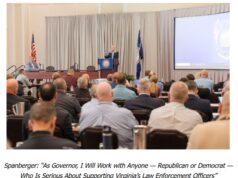From the VA House Democratic Caucus; very impressive!
Virginia House Democrats Advance Special Session Agenda Through House of Delegates
House Democrats pass bills to move forward on COVID-19, police and justice reform priorities; continue work on biennial budget
RICHMOND, VA—Virginia House Democrats have advanced legislation during the 2020 Special Legislative Session — addressing all of the House Democratic Caucus’ priorities — that now moves to the Senate for consideration. House Democrats announced before Special Session that they would focus on urgent issues: providing COVID-19 relief, reforming the Commonwealth’s law enforcement and criminal justice system, and addressing historical inequities — along with their important work on the biennial budget.
The 37 House Democratic bills, with 28 different chief patrons, were passed with broad input and collaboration from all members of the Caucus. These bills will fund safe and secure alternatives for Virginia voters to return absentee ballots during the upcoming 2020 general election, implement housing protections for Virginia families negatively impacted by COVID-19, ban the use of no-knock warrants and neck restraints, require law enforcement officers to intervene or report when they see wrongdoing from colleagues, and streamline the process for localities to remove, relocate or alter Confederate statues and other war monuments on public property.
Legislation concerning police and criminal justice reform was informed and shaped by testimony given at three joint meetings of the House Courts of Justice and Public Safety Committees. These meetings, which were held in July and August, sought both expert opinion and public experiences on numerous issues. The widely-viewed meetings also featured unprecedented live, remote participation and input, setting a new standard for public engagement in the legislative process.
Final passage of legislation on these critical matters will build upon the historic legislative victories achieved during the 2020 Regular Session that led to sweeping changes, which largely went into effect on July 1.
The House continues to work on the biennial budget where House Democrats will prioritize funding for broadband access to support K-12 remote learning for all students, investment in higher education, advancements in telehealth, and extended housing protections for Virginia residents during the pandemic. The updated budget will also take into account additional funding for criminal justice and police reform measures that will be passed during the special session.
The House Democratic Caucus released the following statements from key members:
“At the start of the Special Session, the House Democratic Caucus laid out a thoughtful, bold plan to support Virginians during the COVID-19 pandemic and pass long-overdue improvements to policing and our criminal justice system — we are delivering on those critical imperatives,” said Virginia Speaker of the House Eileen Filler-Corn. “We look forward to finishing this Special Session as strong as we have started it, as we work with our colleagues in the Senate to continue to deliver for families, students, workers, and communities across Virginia.”
“The House Democrats see Special Session as a vital opportunity to aid Virginians suffering due to the pandemic and mistreatment from the police or the criminal justice system,” said Charniele Herring, House Democratic Majority Leader and Chair of the House Courts of Justice Committee. “Our goal from the beginning was to create a better Virginia to live, work, and raise a family — a goal holding increased significance during a changing world in 2020. With the House passage of our legislative priorities, we take a big step forward together.”
“House Democrats have worked together and stood united in our pursuit of a better, more just, and equitable Commonwealth during this Special Session. The economic, public health, and long-standing racial challenges Virginians face today have touched us all as individuals, family members, friends, neighbors, and members of a larger community, and we as a Caucus have worked carefully to address these historic trials with historic solutions,” said House Democratic Caucus Chairman Rip Sullivan. “With the House’s passage of dozens of thoughtful bills, Democrats are proving every day that we as a Commonwealth can do better, and we will do better.”
“The Virginia Legislative Black Caucus has championed these issues for decades and is pleased that several of our issues have been prioritized in order to deliver these long overdue systemic changes during this special session,” said Virginia Legislative Black Caucus Chair Lamont Bagby. “We are hopeful that these historic measures from the VLBC Special Session Priorities continue to advance through the Senate. Our commitment to ending endemic inequality and bringing about equity and fairness in our society will never stop and we look forward to continuing these efforts as session marches on.”
“In light of how the COVID-19 pandemic brought significant inequities out into the open, we sought public input on how to best address the disparities and broken nature of our justice system during Special Session,” said Delegate Patrick Hope, Chair of the House Public Safety Committee. “After hearing expert and public testimony during the joint House Courts of Justice and Public Safety Committee meetings, House Democrats targeted these societal problems with strategic legislation designed to create a more equitable Virginia.”
House Democrats passed bills on the following matters during the Special Session:
COVID-19 Relief
- HB 5103 (Sickles) Establishing ballot drop-off locations, supporting pre-paid postage for absentee ballots, and making it safer to vote by mail-in absentee ballot. **Companion bill SB 5120 (Howell) was passed by the House and signed by Governor Northam into law.
- HB 5046 (Adams) Advancing innovations in telehealth.
- HB 5116 (Guzman) Requiring businesses to provide paid quarantine leave for Virginia workers.
- HB 5048 (Sickles) Mandating transparency requirements for congregate-care facilities during a public health emergency.
- HB 5064 (Price) Providing rent payment plan opportunities for tenants negatively impacted by COVID-19.
- HB 5115 (Price) Protecting housing security for individuals and families negatively impacted by COVID-19.
- HB 5087 (Tran) Removing the sunset clause on Virginia’s short-term compensation program (work-sharing) to facilitate eligibility for CARES Act funds.
- HB 5113 (Roem) Ensuring local school board participation in the federal Community Eligibility Provision (CEP) no-cost breakfast and lunch program.
- HB 5068 (Ayala) Prohibiting garnishments for stimulus relief checks.
- HB 5059 (Willett) Providing certain liability protection for assisted living facilities in relation to COVID-19.
- HB 5028 (Jones) Establishing a presumption of workers’ compensation eligibility for first responders, teachers, and other high-risk essential workers who die or become disabled due to COVID-19.
- HB 5050 (Helmer) Authorizes the Governor, during a declared state of emergency due to a communicable disease of public health threat, to purchase and distribute PPE to private, nongovernmental entities.
- HB 5047 (Murphy) Combating price gouging for Personal Protective Equipment (PPE).
- HB 5093 (Watts) Granting flexibility in enforcing executive orders through civil penalty. Under current law, the only penalty for such a violation is a Class 1 misdemeanor.
- HB 5106 (Cole) Protecting the credit of tenants negatively impacted by COVID-19.
Police and Criminal Justice Reform
- HB 5013 (Bourne) Eliminating qualified immunity for law enforcement officers.
- HB 5072 (Lopez) Empowering the Attorney General to conduct “pattern or practice” investigations of police forces that appear to be violating constitutional rights, including unlawful discrimination.
- HB 5043 (Bourne) Creating a statewide Marcus Alert system.
- HB 5045 (Delaney) Banning sexual relations between officers and arrestees.
- HB 5049 (Helmer) Demilitarizing police departments by prohibiting the acquisition and use of certain weapons by law enforcement agencies.
- HB 5058 (Hope) Eliminating certain pretextual police stops.
- HB 5062 (Mullin) Codifying prosecutorial ability to dismiss charges.
- HB 5090 (Hurst) Expanding disclosure of law-enforcement criminal incident information files for closed or cold cases under the Virginia Freedom of Information Act.
- HB 5099 (Aird) Prohibiting no-knock search warrants.
- HB 5112 (Levine) Mandating the duty of one officer to report the misconduct of another officer.
- HB 5146 (Herring) Reforming Virginia’s laws related to expungement of police and court records.
- HB 5148 (Scott) Increasing earned sentence credits.
- HB 5029 (McQuinn) Mandating the duty of one officer to intervene to stop use of excessive force by another officer.
- HB 5051 (Simon) Requiring decertification of a law enforcement officer who is terminated or resigns for violation of law, violation of departmental policies or procedures, or during an internal investigation.
- HB 5069 (Carroll Foy) Banning the use of neck restraints by law enforcement.
- HB 5098 (Askew) Expanding the definition of hate crimes to include false 911 calls or reports to law enforcement against another person made on the basis of race, religious conviction, gender, disability, gender identity, sexual orientation, color, or national origin.
- HB 5104 (Price) Strengthening the assessments and review of prior law-enforcement employment records required before hiring law enforcement officers.
- HB 5109 (Hope) Standardizing and enhancing training by criminal justice academies and establishing required in-service training standards for law enforcement officers.
- HB 5055 (Herring) Strengthening laws related to Citizen Review Panels.
- HB 5108 (Guzman) Diversifying the Department of Criminal Justice Services’ Committee on Training.
Equity in Virginia













![Video: VA11 Dem Nominee James Walkinshaw Says “I’m excited to vote in November as well, but we’ve [also] got to be excited to vote on September 9th”](https://bluevirginia.us/wp-content/uploads/2025/08/walknshawwhite-100x75.jpg)
